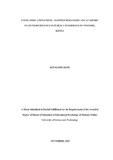| dc.description.abstract | The emergence of Covid-19 was unexpected and has kept on toes education stakeholders globally in preparation for any future health menace. Covid-19 related effects have caused stress among professionals especially to the university academic staff, physically, emotionally, and psychologically. This has further induced stress that has led to a decline in their academic performance. Even so, little has been done about the pandemic effect on academic staff performance. The purpose of this study was to investigate Covid-19 Related Stress, Adaptive Behaviors, and Academic Staff Performance in Public Universities in Western, Kenya. The objectives of the study were: to establish factors associated with Covid-19 related stress among academic staff in public universities in Western Kenya, find out the effect of Covid-19-related stress on academic staff performance in public universities in Western Kenya, assess the effect of adaptive behaviors related to Covid-19 on academic staff performance in public universities in Western Kenya, determine the relationship between Covid -19 related stress, adaptive behaviors and academic staff performance in public universities in Western Kenya. The study was anchored on Transactional Stress Coping (TSSC) model. The research adopted a cross-sectional descriptive design. About 650 academic staff formed the total study population. Cluster, convenient, and disproportionate random sampling techniques were used to acquire a sample size of 247 respondents, however, only 245 (98.3%) responded to the questionnaire. The study adopted Taro Yamane's formula with a confidence level of 95% and a margin error of 0.05. Data was collected using a semi-structured questionnaire and interview schedule. Research ethics were maintained by giving respondents informed consent forms to fill. Piloting was conducted at Maseno University where the pilot study sample size was 10% of the 247 (study’s sample size). Questionnaire items consistently yielded similar results with the Cronbach alpha ranging from 0.732 to 0.874. The supervisors and independent experts’ judgments were used to ascertain the content validity. Descriptive statistics were presented in themes using frequencies and percentages, while inferential statistics were analyzed using, test-test and Pearson Correlation Coefficient and data presented in tables and charts. Six factors: unsupportive administration, fear of retrenchment and salary delay, unfriendly family environment, working publication manuscript, collaborative research grants were the major predictors of Covid-19 related stress among the academic staff. Covid-19-related stress caused a decline in academic performance with coefficients of r being -0.218, p=0.001, while a combination of individual and institutional Covid-19-related stress adaptive behaviors resulted in an improved academic staff performance with coefficients being r (245) =0.411, p= 0.00 and r (245) = .489, p= 0.00. The study recommends capacity building through competency based ICT trainings for academic staff, re-engineering of staff mental health and telehealth services and creating social support platforms for the academic staff communicate and share teaching and life experiences. Findings from this study benefit policy-making and future research on academic stress among any other distinct group of academia in future of other emergent events. | en_US |

